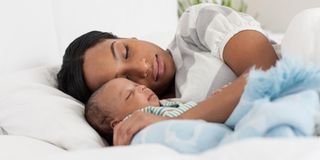Beware of the risks involved in sharing a bed with your baby

Whether or not to bed-share, parents need to decide what is best for the child and themselves. But safety of the baby is paramount.
PHOTO/NET
What you need to know:
To avoid accidents, the child’s head and face should never be covered. Fluffy blankets, loose bed sheets should be kept away from the child’s sleeping area. The child should also be made to lay on their back.
Peter is a close friend from our university days. With him, no topic is off limits for discussion. He visited me recently and after him greeting my two-year old daughter, I somehow remarked that we (my wife and I) share a bed with her. “What?” He almost jumped out of his skin.
“Yes, we have bed-shared with all our three children,” I said as if to intentionally make it sound worse. “Why? He asked.
“But why not?” I said, trying to calm him down. “For Sarah and I, we do not share a bed but room with a child and as soon as the child makes three months, they are off to their room.
“That is selfish,” my wife, who was in ear-shot distance trying to fix us lunch, bluntly put it to him. “We bed-share until the child is three years.” She added, with an air of rightness.
In an attempt to cool the emotions the subject had stirred, he explained to us that Sarah was born and raised in Europe, where infants sleep in their own bed. In Uganda, however, that would be considered selfish, uncaring and even negligent. Here, infants share beds with their parents or grandparents, or whoever breastfeeds them.A close study of bed-sharing or sharing another sleeping surface, has pros and cons.
Let us begin with the pros: Comfort ,safety & longer sleep
The body-to-body contact between mother and child is good for stabilising a baby’s body temperature and regulate breathing because it is still immature and lowering their stress levels.
Research suggests that mothers and children who bed-share, sleep longer and faster because they are in close proximity with each other. The mother releases oxytocin- a hormone that plays a role in social bonding, reproduction, and the period after childbirth, and the baby’s needs are met conveniently when they arise, giving both mother and child quality time to sleep.
Eases breastfeeding
Co-sleeping helps a mother protect and attend quickly to the child who wants to feed, or is uneasy, unwell, or awake; Rashida Namiiro, a mother of three who has co-slept with all her children says, “I sleep with my babies to feel, feed and monitor them at any time of the night. It is just a matter of turning to the baby. It is easy and convenient.”
Bonding
Some Parents feel that close body contact gives them feelings of attachment to their little ones now and later when they are adults. Dr. Moses Mulyowa, a pediatrician at St Ruth Medical Centre, Kireka, says “Research suggests that children who bed-share develop stronger emotional bonding with their parents.” A child who bed shares is likely to become more independent, confident, and attach more securely later in life than the one who did not.
Prolonged breastfeeding
Children who bed-share have a steady supply of milk because they are breastfeeding frequently and longer and this is good for the overall health of the child. This protects them against illnesses because the child is exposed to the mother’s antibodies through the low-calorie composition of breast milk.
Low rates of sudden infant deaths
It is worth noting from several studies that infant mortality via SIDS occur less in communities that bed-share with their children. For instance in Japan, SIDS rates are the lowest in the world. These advantages notwithstanding, there are downsides to parents sharing beds with infants.
Sleeping accidents
If a parent is drunk, or tired, or on drugs, if they roll over by accident, or if they have sleeping disorders, there is increased risk of accidents or injuries to the baby, especially if the child is below the age of one.
Sleep deprivation
With a child in the same bed, a parent’s sleep will always be interrupted by all means. According to anthropologist James McKenna, the author of Safe Infant Sleep: Expert Answers to your Co-Sleeping Questions, babies wake mothers about 60 percent of the time. “I am a light-sleeper; I am easily disturbed by noise, light, odours and movements within my sleeping space so I prefer a child sleep separately from me so I can also sleep,” argues Joan Isoke, a mother of three who does not support bed-sharing. Research also indicates that disturbed sleep leads to postpartum depression on the part of the parent.
Earlier bed time
If the child wants to go to bed, the mother must also go to bed or pretend to. Some children will not sleep unless the mother is in the same bed with them. This might come off as controlling to the parent.
Difficult transition
A child who is used to sharing a bed with their parents might find it difficult to settle in their own bed when the time comes for them to, something that causes them separation anxiety. “When it was time for my son to transfer to his own room after co-sleeping with us for a while, he rejected the idea. I had to shut him in his new room and let him cry it out until he fell asleep. Looking back I should have handled the situation better”, a one Arinaitwe regrets.
For proper bed-sharing to take place and whether or not to bed-share, parents need to decide what is best for the child and themselves.




